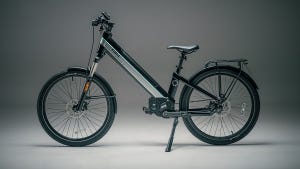How Automation Advances Sustainability in EV Battery Production
Successful EV battery production requires adaptable solutions that emphasize sustainability, precision, and efficient automation for a greener future. Festo’s expert explains.
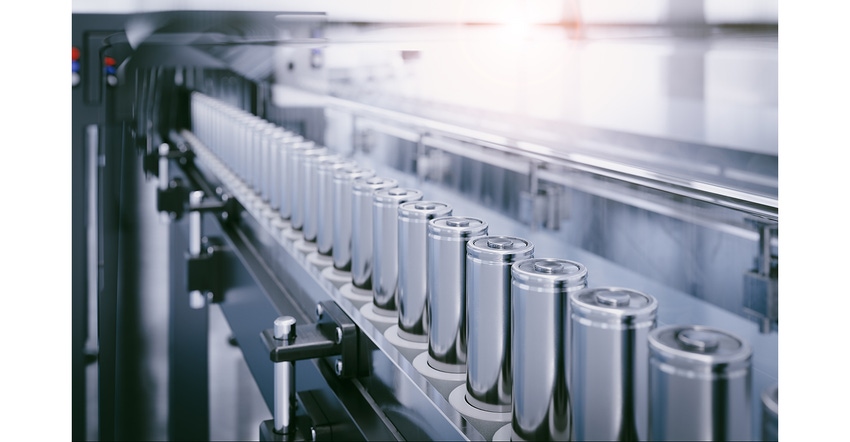
The need for EV battery production to become sustainable as well as timely is an ongoing challenge for battery makers. Festo—an automation supplier—argues that the solution can be found in automating the Electric Vehicle (EV) battery production journey, from material handling in controlled environments to degassing, module assembly, and the positioning of housings onto the vehicle frame. Festo’s Emerging Technologies Business Development Manager, Lawrence Lin described his company’s offerings to Battery Technology at The Battery Show North America.
PLC compatibility
Festo is committed to offering adaptable solutions that cater to the diverse needs of its customers, Lin said. According to Lin, “It's important to note that the specific PLC system a customer employs is not a limiting factor in our automation solutions. The remarkable aspect of Festo's offerings is our seamless adaptability to these varying PLC configurations through a straightforward top hat adjustment.” Lin continued, “This adaptability extends across our product range, from motor controllers and IO blocks to pneumatic and electric actuators. Festo's solutions empower a smooth transition from manufacturing individual cells to module assembly and pack assembly for batteries, all the way up to the production of an Electric Vehicle (EV).”
Process automation and circular economy
Festo's handling and process automation solutions are central to supporting the circular battery economy.This approach involves repurposing and recycling EV batteries, reducing the need for new materials, lowering the environmental impacts of extraction, and minimizing supply chain disruptions.
Festo’s controls and process valves enable the automated extraction of valuable materials from shredded EV batteries. Lin said, “Festo actively assists customers in processing black mass, a crucial step in battery recycling. When batteries reach the end of their life cycle, they are crushed into a fine black powder. Then, through carefully controlled steps, the raw materials, such as lithium, manganese, and cobalt, are separated and recovered from the black mass. Festo provides essential support for this process using specialized equipment, including butterfly valves, pinch valves, and quarter-turn actuators.”
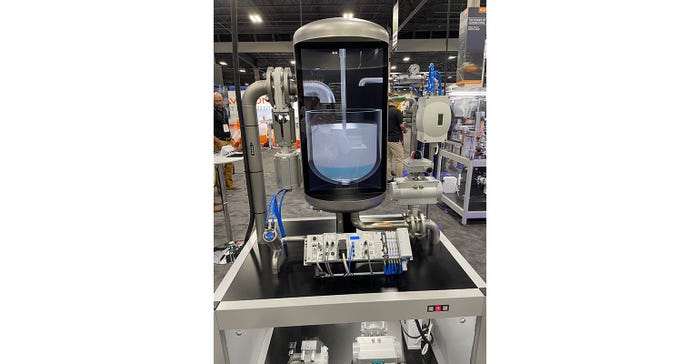
Acids are introduced into the battery slurry for easy separation and collection. This process reclaims materials like cobalt, gold, lithium, manganese, and more, which can be reused in lithium-ion batteries. Key Festo components in this extraction process include the CPX-MPA controller, DFPC linear actuator, KVZA process valve, and VZXA angle seat valve.
Cell production and module assembly
Festo also facilitates a seamless transition from cell production to module assembly in the battery manufacturing process by using their Gantry XYZ systems. This transition is a critical juncture where precision and coordination are paramount, as any misalignment or error can result in inefficiencies or defects in the final battery product.
According to Lin, gantry systems maintain accuracy and consistency. For instance, while a six-axis robot may have an accuracy of plus or minus 10-micron in some regions of its workspace, it may decrease to plus or minus 20-micron at further reaches. In contrast, a gantry system maintains a consistent plus or minus three-micron accuracy throughout its working envelope, both in the middle and at the edges.
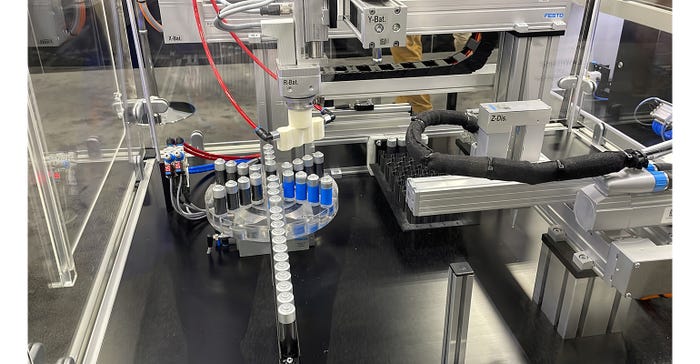
Moreover, Lin credits that gantry systems require less guarding due to their accuracy and precision, enhancing safety and floor space efficiency. This becomes particularly advantageous in battery manufacturing, where space utilization is critical. The reduced need for guarding translates to more factory floor space, ultimately contributing to cost savings and improved production efficiency.
Lin continued, “There will still be use for robots, but we're seeing more gantries and better production."
Battery disassembly for recycling
According to Festo, automating the disassembly process is paramount due to the surging demand for battery recycling. Lin emphasized, "Every battery that will be installed today, seven to 15 years from now, must all be recycled. So we need to start thinking about it now. And we're helping the battery industry by ensuring we can support the circular economy of recycling of batteries through automation.”
Disassembling battery housings and extracting modules and other components is a labor-intensive task. Festo's dynamic display offers a simulated demonstration of the automated mechanical disassembly process for battery housings, resulting in the separation of modules, battery cells, and various components.
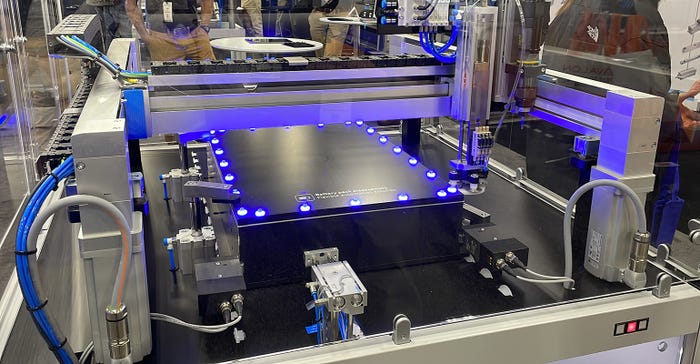
Automation companies must anticipate the future of battery technology while developing current solutions. They aim for precision, efficiency, and sustainability in their automation processes. This forward-thinking approach is crucial to meet the increasing demand for eco-friendly energy storage. By focusing on accuracy, effectiveness, and environmental responsibility, these companies are helping to create a cleaner and more sustainable future. Batteries are not just energy storage devices; they are also drivers of ecological improvement.
About the Author(s)
You May Also Like



